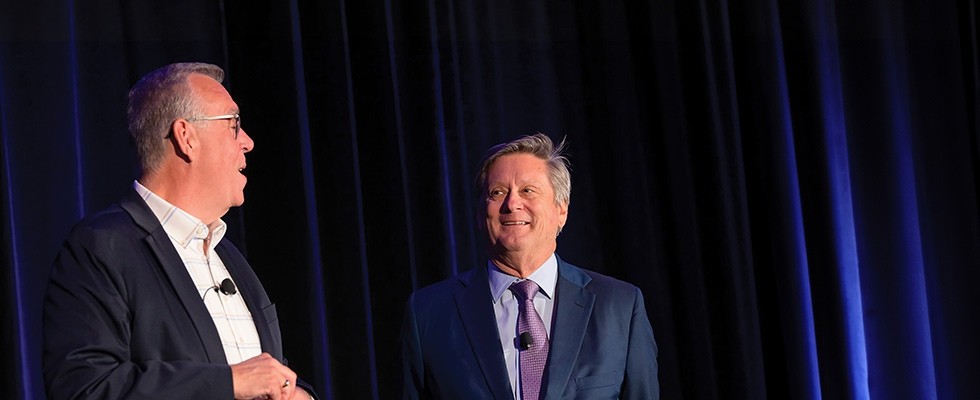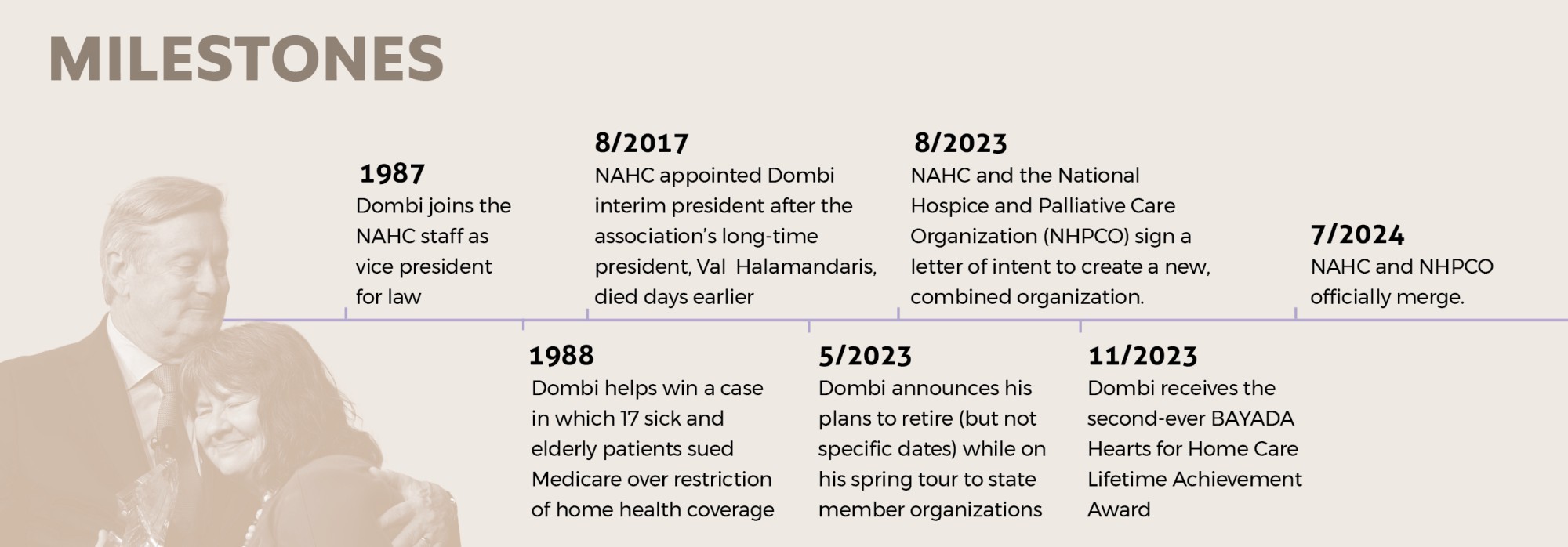

A little less than a year ago, William Dombi, the president of the National Association of Homecare and Hospice (NAHC), called his young granddaughters onto the stage at the organization’s annual conference. He would be retiring soon, he told the crowd, in part to be able to spend additional time with them—and to finally get a little rest.
Over the past four decades, Dombi has been tirelessly involved in most efforts in Washington affecting home health and hospice, including the expansion of the Medicare home health benefit in 1980, the creation of the hospice benefit in 1983, the creation of the home health prospective payment system and national health care reform legislation in 2010. He joined NAHC as its lead counsel in 1987 and helmed the landmark lawsuit that reformed the Medicare home health services benefit.
Now NAHC is merging with the National Hospice and Palliative Care Organization (NHCPO); that newly allied group is in the process of selecting new leadership. With his end-of-year departure looming, HomeCare sat down with Dombi to look back at past achievements and see what comes next for the industry.
HomeCare: How are you feeling about leaving? I imagine it’s somewhat mixed.
Dombi: It depends on the day. I mean, obviously, I've committed a huge part of my life to working at the National Association for Home Care and Hospice and am extraordinarily excited about the new Alliance, as we’re calling it, because it's been something we've worked toward for quite a few years; we’ve had a lot of starts and stops but now we’ve crossed the finish line on that. I’m excited about it, but also kind of excited not to have to get deep into the weeds of the integration of the two organizations, which I think is going to take a lot of work. We've been going through that on a daily basis, actually. … I've long put in my head that this day would be coming. Frankly, when I took over following (previous NAHC President) Val Halamandaris’ passing, the board asked how long can you stay? And I said three years. And they asked if I could guarantee four. So I said okay, and then they said five, and now we’re at eight. So it's not like these thoughts are new thoughts or anything's abrupt.
HC: But you have other things you want to do, right?
Dombi: There are definitely things that I'm looking at, but I think I've concluded that I have to stay intellectually stimulated, and a prime way of doing that is to still have some engagement in where I've devoted myself for those decades. And so, because I don't know yet exactly what that's going to be, we have a lot of conversations ongoing, but apparently, others besides myself feel that I bring some value, even in my waning years. … Whatever I put together for the plans, I have to have a little bit of free time.
HC: When you look back—as far back as you want to look—is there any one thing that feels dramatically different? How would you compare the earlier days of the home health world and where it is now?
Dombi: When you look back, you’ve kind of got 20/20 vision. But I can look back at the first day that I came to the association in 1987, and from thereafter, it's been an incredible time of change. It's never really had a calm, stable moment: changes in reimbursement systems, changes in technology. Things that were serious threats and serious opportunities coming along have been what's happened over those four decades. So, in terms of looking back, it's: Did we grab the opportunities that were there? Did we withstand those threats that were there? Did we overcome them? How did we overcome them? I think probably this happens to lots of people—you do reflect on the past as it relates to learning something.
When you're young, you don't think of history as important, but when you get older, history starts teaching you things that you should have learned earlier on. Now, hospice is going through many of the same kinds of challenges that home health went through in the 1990s, with issues of program integrity, questions raised about the quality of care, reimbursement models. … It’s history repeating itself.
Look at the things that were shown in COVID, and how fast homecare could turn on a dime and suddenly become a totally mainstream service in a really chaotic pandemic. And on our list of advocacy issues today is extending the hospital-at-home program. Back in 1987 when my predecessor brought that up, people looked at him like he must be on a bender, drunk or something. And now, where’s the ceiling that’s there for opportunity? There has to be a ceiling somewhere, but it seems to be higher than it was a decade or two ago.
HC: You talk about looking back and learning. Is there something that you feel like you might have done differently?
Dombi: I think that looking back, we could have put more energy into data research and evidence to support our positions instead of relying upon someone intuitively saying this is less costly, this is quality care. … We learned that over time, and I think involved with that is a part of a game plan for the future to see if the community—as it has come together to form the alliance—can come together further to help create a real-time data approach, instead of relying upon statistics coming out of (the Centers for Medicaid & Medicare Services) or dealing with the largest homecare program, Medicaid, where the data has been pretty much non-existent.
I would've also done one other thing, and we did that in what we call NAHC 2.0, which was to create a higher degree of engagement among the members in what we do—exponentially multiplying the resources effectively. A constituent in Kansas has a much more forceful voice in Kansas than a lobbyist in Washington, D.C., talking to a Kansas congressional office. We should have done both back then. We did some of it, but we could have done more. I think everybody learns lessons as they go on, not just homecare, and a lesson would be to bring it home.
HC: Is there something that you're particularly proud of accomplishing?
Dombi: I do think there are several different spots in time where we could be very proud from an organizational standpoint and from what my role was. I came to the association to file a lawsuit against the Medicare program, and it was a fully successful effort. It might have had a short life because it was overly successful … and Congress came in and decided to take a huge amount of money away and crippled home health care for a decade at least. The lawsuit itself was one of the highest points of my professional life. It was just one of the number of lawsuits I brought, but it’s the one that stands out the most—having 13 members of Congress as plaintiffs in the case, having AARP join us as a friend of the court, and then winning the case with a very human testimony from the spouse of one of the named beneficiary plaintiffs. All those pieces just came together and accomplished one other thing: We gained respect within the Medicare program. Instead of looking at us as an enemy troublemaker, they gained respect for us. The fear of the board of directors, for some of them, was that we would lose any opportunity to ever work with the Medicare program in a collaborative sense. And their fear was 180 degrees off.
HC: Is that respect still there?
Dombi: I think it is still there. At the same time, that doesn't make us best friends, but when we say something, it's pretty clear they listen. Sometimes they listen and embrace, sometimes they listen and defend their position more than they've done perhaps in the past. But they know that we're going hold them accountable, whether it be in front of Congress, in front of a court, in front of the public, so that they have to be prepared to be able to defend the policy choices that they make.
That itself has to be considered, without a doubt, as a gain. I mentioned what I hoped we could have done earlier, the “NAHC 2.0” as we labeled it … that I believe was a great success. NAHC was stumbling at the time, had lost a longstanding leader. But that created a new opportunity to rebuild, redefine and re-engineer the organization, which is what NAHC 2.0 was all about. And a mainstay of that was the level of engagement of our members as actual members, not just as customers. When you’re in an association, you like the word “we.” That's what I think we got out of NAHC 2.0. And I think that was what helped us end up crossing the finish line with NHCPO and pulling the two organizations together.
I think what we are doing by pulling this together, is we’ll have less division, fewer differences of views, and any differences we have are worked out internally, which will bring absolutely a better chance of success. When you're divided on an advocacy issue, you have a much greater chance of failure.
HC: What would you tell your younger self, if you could go back to the early days?
Dombi: I think probably, if anything, to spread the word about how home health practitioners and home health patients bring things together. And to enlist a greater army of lawyers into the work, too!
HC: Is there advice you would offer to somebody new starting out in this business?
Dombi: Put the patient first and you'll be successful. But one of the things that I learned as we saw an evolution going on now in hospice—and previously in home health services—is that you have to learn how to run a really solid business too. Even with a patient as your priority, as your predominant primary focal point, you still have to run a business. … Because if the business is not viable, it’s not going to be around for any patients.
